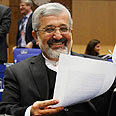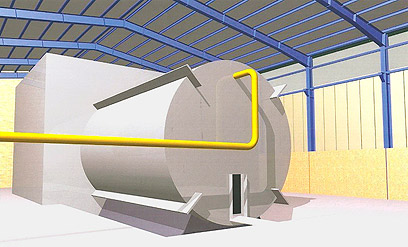
Iran talks to continue, both sides see progress
IAEA officials report of good exchange of views after talks with Iranians in Vienna. Talks to resume Monday
UN nuclear negotiators seeking to probe Tehran's nuclear program for signs of secret work on atomic-weapons technology spoke of a good exchange of views Tuesday after talks with Iranian officials, who described the meeting as having made progress.
Neither side elaborated on the substance of their talks. But they stood together as they talked to reporters and in another indication that some common ground had been found after more than four years of stalled discussions, both said the talks would resume Monday.
Related stories:
- Iran hangs man for killing nuclear scientist
- Iran: West should 'correct its manner'
- Drawing focuses on Iran's nuke work
International Atomic Energy Agency officials were pressing for access to a site at Iran's Parchin military facility that they suspect was used to test multipoint rapid explosives of the kind needed to set off a nuclear charge. Iran has denied such tests have taken place but has fended off repeated IAEA requests over the past three months for quick access.
Tehran last month said a visit was possible but only after "modalities" were worked out, and diplomats accredited to the IAEA and critical of Iran's nuclear program have expressed concern that could turn into a drawn-out process that would allow Iran to "sanitize" the site of any signs of the explosives tests.
Chief Iranian delegate Ali Asghar Soltanieh indicated Iran is continuing to insist on a comprehensive plan on what could be visited when. He told reporters the talks resulted in "progress ... regarding the preparation of modalities of a framework for resolving our outstanding issues." He spoke of a "fruitful discussion in a very conducive environment."

Drawing of secret chamber in Parchin (Photo: AP)
IAEA Deputy Director General Herman Nackaerts was more circumspect. He said the two sides had talked about "a number of options to take the agency verification process forward in a structured way."
Describing the meeting as focusing on "unclarified issues related to possible military dimensions of Iran's nuclear program," Nackaerts said: "We had a good exchange of views."
A senior diplomat who said he was familiar with the discussions said both sides had managed "to close the gap a little" on Parchin. While the Iranians wanted a roadmap on how the visit there should take place, they were no longer insisting on intricately mapping out each step - an approach the agency rejected in March as unnecessarily delaying access. He demanded anonymity because his information was confidential.
There was no word on how quickly the agency hoped to gain access to the site. But with nuclear talks between Iran and six world powers scheduled for May 23 in Baghdad, and the IAEA scheduled to release its latest report card on Iran's nuclear strivings a few days later, any such visit was unlikely before those two events, even if agreement was reached on an inspection early next week.
Nackaerts went into the first set of talks Monday saying the IAEA was looking to visit facilities where it suspected such secret nuclear work was ongoing, and to interview scientists it suspects of involvement and look at relevant documents. All are goals the agency says have been stymied by Iran's refusal to cooperate.
Another diplomat - who also demanded anonymity because his information was confidential - said the Iranians were asking for single visits to sites with no right to return, something the agency was opposed to.
A computer-generated drawing provided to the AP by a nation critical of Iran's nuclear program late last week shows such a structure, with the official who shared the drawing saying it was drawn based on information from someone who saw it.
Former IAEA Deputy Director Olli Heinonen says it is similar to a photo he has seen that depicts the chamber, down to the matching colors.
The senior diplomat familiar with Tuesday's discussions in Vienna says Iran has never acknowledged or denied the chamber's existence.
- Receive Ynetnews updates directly to your desktop










